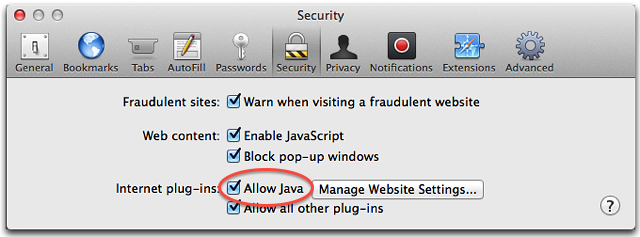
Java Update For My Mac
The screen shots and instructions below are for Java 8 Update 65 (8u65). If you are installing another version, make sure you change the version number appropriately. Install Java on Mac. Download the jre-8u65-macosx-x64.pkg file. Review and agree to the terms of the license agreement before downloading the file. How to Uninstall Java on Mac OS X. Lowell Heddings @lowellheddings September 29, 2015, 3:54pm EDT. Java is, and always has been, the source of many woes.  And security holes. Lots of security holes. There’s really no reason to have it installed anymore, especially now that Minecraft has its own bundled Java for both OS X and Windows.
And security holes. Lots of security holes. There’s really no reason to have it installed anymore, especially now that Minecraft has its own bundled Java for both OS X and Windows.
Note Note: I'm generally a fan of Apple and own many of their products. My primary computer is a MacBook Pro, which I wouldn't trade for anything. But Apple has really screwed this one up. Apple has hurt its users who develop in Java by declaring an end to Java support but continuing to update Java 6 using its automatic update program. This means that installing Oracle Java 7 JDK is a hassle to begin with, and if you blindly accept all of Apple's software updates (that is, you don't remember to uncheck Java updates when they appear) you'll have to re-do parts of your Java 7 installation from time to time because Apple's Java updates reset all the symlinks to point to its own Java 6.

In any case, here's what you need to do to install and use Java 7 on Mac OS X and fix Apples 'updates' if they slip by you. At the time of this writing the current Java 7 is update 17 (jdk1.7.0_17). First Time Java 7 Installation Get the Java 7 JDK (not JRE) from here:. You want the Mac OS X x64 download (I couldn't provide a direct link becuase the page I linked in the previous sentence requires you to accept a license agreement). It's a.dmg (disk image) containing a package installer. Double click the package installer, enter your password when prompted, and your new Java 7 JDK will be installed in a few minutes.
This step only places the JDK on your hard disk. Now you have to set a few symlinks so that you can actually use it. Figuring Out if You Have Apple's Java 6 Apple installs its JDK in /System/Library/Java/JavaVirtualMachines. If you have Apple's JDK and the symlinks are set up for it, perhaps after you've followed these instructions but then allowed Apple's Software Update to install a Java update, you can find out with java -version or by seeing where the symlink at usr/bin/java points. If java -version prints something like 'Java 1.6' (the important part being the '1.6') or the symlink at usr/bin/java points to /System/Library/Java/JavaVirtualMachines (note that Apple installs under /System/Library, Oracle installs under /Library), then you need to follow the rest of these instructions. If you use an older version of Java, like Apple's Java 6 and try to write programs that use Java class files that were compiled with a newer version of Java you may see an error like this: warning:./Location.class: major version 51 is newer than 50, the highest major version supported by this compiler.
It is recommended that the compiler be upgraded. This message means you're using Java 1.6 (version 50) with pre-compiled.class files that were compiled with Java 1.7 (version 51). In general, you can use the Java disassembler, javap to find out which version of Java was used to compile a class. Note Note: the '$' character is the shell prompt. In the example shell interactions in this guide, the commands you type will appear after a shell prompt. $ javap -verbose Location.class head Classfile /Users/chris/Downloads/PacmanSkeleton/Location.class Last modified Mar 8, 2013; size 1241 bytes MD5 checksum 2e22b98aa3c1fb2bb3a06e5cd4f2fd24 Compiled from 'Location.java' public class Location SourceFile: 'Location.java' minor version: 0 major version: 51 flags: ACC_PUBLIC, ACC_SUPER Constant pool: Note that I piped the output of javap -verbose through head because it prints a ton of information.